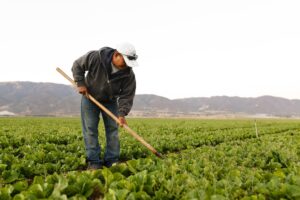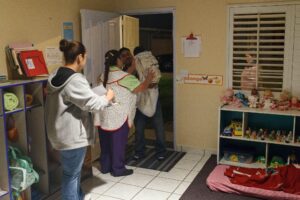Special thanks to Executive Director of the National Migrant Seasonal Head Start Association Cleo Rodríguez for this guest blog in celebration of Hispanic Heritage Month.
The Migrant and Seasonal Head Start (MSHS) program was created in 1969, four years after President Lyndon B. Johnson launched Project Head Start as part of his initiative to end the war on poverty. The MSHS program is unique. It works around the long hours and demanding schedule of rural farmworkers to provide high-quality, comprehensive early education services to children, from birth to five years of age, while their parents are hard at work in the fields providing a secure food source for our country. Throughout their time in MSHS, staff help children acquire and enhance the foundational skills necessary for school success.

Head Start Policy Council Member Antonio Hernandez starts his work day at River Roads Fields in Chualar, CA, after dropping his son off at a local Head Start family child care program.
The National Migrant and Seasonal Head Start Association (NMSHSA) was established as a membership organization to support the national network of MSHS programs located in 34 states across the country. This role includes taking the lead in bringing the voices of MSHS programs and farmworker parents to the nation’s capital. Through these advocacy efforts, farmworker families have a platform to reach their members of Congress and advocate for change.
For over twenty years, NMSHSA has been a traditional membership organization. In the last three years, however, NMSHSA has dramatically expanded beyond its typical advocacy role to include a more comprehensive and innovative range of services and activities supporting the network of MSHS programs.
Expanded Advocacy Role
NMSHSA has expanded our advocacy efforts to encourage legislators to address current challenges facing Head Start, such as eligibility and staffing challenges, through new partnerships. We are strengthening our voice to raise issues that are important to our farm working families, such as:
- The Farm Workforce Modernization Act that will amend the Immigration and Nationality Act to provide for terms and conditions for nonimmigrant workers performing agricultural labor or services in the U.S.
- The Deferred Action for Childhood Arrivals
- The Development, Relief, and Education for Alien Minors (DREAM) and Promise Act
The ultimate goal is to institutionalize each piece of legislation into law. Each of these efforts will provide relief for our families and their children. It has been an unusual journey as the NMSHSA has embarked upon new initiatives to mobilize our programs, improve outcomes for families, and have a lasting impact.
Elevating the Voices of Parents

Antonio Hernandez arrives at Maria Cortez’ Early Head Start family child care program at 5 a.m. for drop-off.
As often as we explore and expand our efforts, one of our cornerstone priorities is elevating and empowering the voices of our farmworker families. NMSHSA has always focused on the active involvement of our parents. During these recent times of uncertainty, they are eager to speak up about the injustices they experience in the workplace despite being considered essential workers during this COVID-19 pandemic.
Parents continue to speak up about the unique needs of their children and their need for additional support. Families have been passionate and intentional in their use of various platforms which include conferences, social media, parent meetings, and even town halls hosted by NMSHSA.
To further expand their advocacy skills, a group of parents took part in an inaugural eight-week Parent Ambassador Program that equips them with skills in the areas of civic engagement, mental health, and other important topical areas, to take back to support other parent leaders within their communities.
Developing the Next Generation of Leaders
The NMSHSA has created several initiatives to support the development of the next generation of leaders from our farmworker community. In 2011, NMSHSA created a summer internship program to provide a second “Head Start” to former MSHS students who are currently enrolled in college. Every year, four young college students who are alumni of an MSHS program are recruited to become summer interns in Washington, D.C. This internship program serves as an opportunity to disrupt the common assumption that farmworker students don’t make it farther than the fields. We are committed to dispelling this unfounded myth and creating strong leaders.
Over the last decade, we have learned that most of the alums are first-generation, Hispanic students who are proud of their farmworker background and deeply committed to supporting the farmworker community. Many of our interns have utilized this summer experience to start their educational success and professional development trajectories, going on to do important work for the farmworker community. For example, Lionor Galindo (Class of 2015) graduated from the University of California – Davis in 2019 with a Master’s degree of Science in Child Development and is currently working as a Political/Legislative Assistant for the United Farm Workers organization. Beyond their commitment to their community, there is a common theme and understanding among our former program participants, and that understanding is the commitment to pay it forward!
Expanded Services & Supports for Families
In the face of what has been an unforeseen time of loss, struggles, and challenges brought on to our community by the COVID-19 pandemic, NMSHSA has developed a number of strategic collaborative partnerships to expand the depth and breadth of services and supports offered to the network of MSHS programs in response to emerging needs to support farmworker families.
For example, NMSHSA worked in partnership with Justice for Migrant Women, the Eva Longoria Foundation, and Latinx Therapy to support the pilot of the Healing Voices Project. This project provided therapists to farmworker families at the height of the pandemic. It has helped many farmworkers heal from the trauma they endured as immigrants and farm working families and break generations of mental health stigma.
A Research Agenda to Drive Practice and Policy
Farmworkers play a vital role in the United States, yet they are often overlooked. NMSHSA has developed a strong and growing research agenda to collect and synthesize data to increase the public’s awareness of the important role of farmworkers, as well as to drive practice and policy efforts facilitating the work of MSHS programs to support farmworker families.
As one example, NMSHSA has partnered with NORC at the University of Chicago to develop and test the feasibility of providing telehealth services within rural early childhood programs. This innovative telehealth services project, funded by the Kellogg and the Robert Wood Johnson Foundations, aims to reduce historical health care access barriers and improve the health outcomes for farmworker children served by MSHS programs.
Another example is our COVID-19 Vaccine Hesitancy Project, also supported by the Kellogg Foundation. Developed in partnership with NORC at the University of Chicago, the focus of this project is to support MSHS programs’ local COVID-19 vaccination efforts and increase the public’s awareness of the powerful role that the trusted relationships between MSHS programs and farmworker families play as a public health model to reduce health care access disparities. Through this project we are dispelling common myths in the Hispanic community about vaccines by creating an environment that feels safe for families to come to and get vaccinated, overcoming historical barriers to accessing critical health care services, and making time to hear the concerns of parents and their thoughts on the vaccine so we know how to better reach families. This is important not just within the farmworker community but expands to the Hispanic community at large and other underserved populations.
NMSHSA is proud to serve the farmworker community and bring light to the issues that our MSHS families face, and as many problems that they may face, one thing is for sure, they will continue to work hard to keep food on the tables, not only their own families but every family across America.
As an association, we simply are amazed by the resolve each has to overcome the fast pace challenges that have burdened them and yet they continue to forge forward for the betterment of farmworker children and their families.
Related Content
